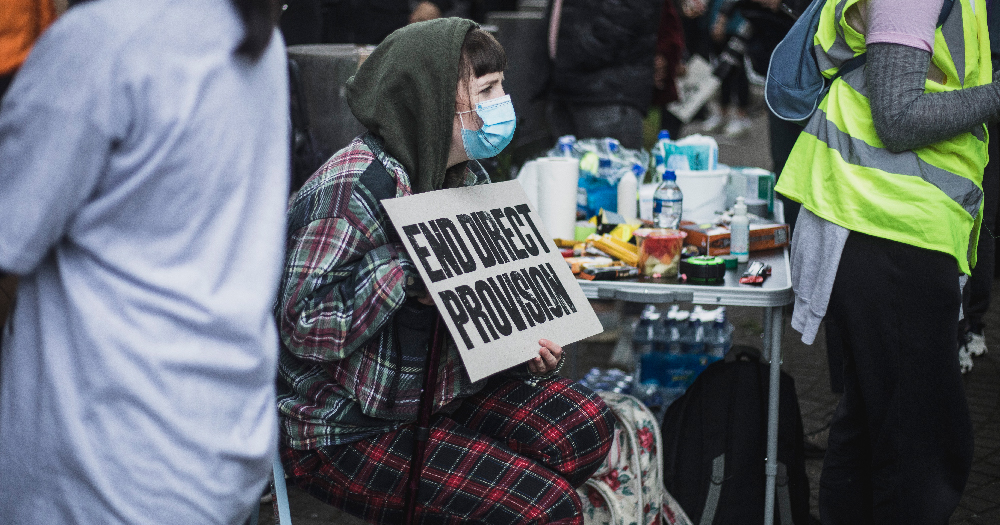Advocacy group Doras are calling on the Government to end Direct Provision by speeding up the implementation of an international protection system.
To mark 21 years of Direct Provision in Ireland, Doras has charted a timeline from its commencement in April 2000 to the February 2021 White Paper, which promised an end by 2024. The advocacy group are also demanding that the Government takes immediate action towards implementing an international protection system.
On the Doras website, the group wrote, “Despite report after report highlighting the failures of the system, over 7,000 people still live in institutional settings with their dignity and rights undermined. The 2020 report of the Advisory Group on the provision of support, including accommodation, to persons in the international protection process advised that it is not fit for purpose and should be abolished. That message has been consistently conveyed to successive governments over the last 21 years. And yet, Direct Provision remains.”
"Not taking steps to clear the backlog of cases makes the implementation of the White Paper very difficult."
See our timeline of #DirectProvision & read our full statement reflecting on 21 years of DP & what Govt. needs to do next: https://t.co/IVm280N6SR pic.twitter.com/2Us2TodGSZ
— Doras (@DorasIRL) April 12, 2021
In February 2021, a Government White Paper detailed the phasing out of the Direct Provision system that has involved appalling housing conditions and vulnerable people being placed in dangerous situations. It further outlined a new two-phased approach for people seeking asylum, with the first phase planned to take no more than four months and will see accommodation by State-owned companies and not run by private companies.
Doras are urging the Government to release a clear implementation plan and speed up the end of Direct Provision. On their website, they wrote, “To show its commitment to this goal, and to ensure an effective transition to a new system that respects and protects human rights, the government needs to speed up the international protection process now.”
“It must also give permission to remain to people who have been waiting for a determination on their case for over two years. Leaving people waiting in a system that denies their human rights for that length of time is unreasonable and unnecessary. And not taking this step to clear the backlog of cases makes the implementation of the White Paper very difficult,” Doras continued.
In 2019, RTÉ News reported that there were 6,355 people in Direct Provision, an increase from 6,106 in December 2018, according to figures from the Department of Justice. There are currently an estimated 7,000 people living in these accommodations, above the Government’s contracted capacity of 3,500.
Due to the overcrowding of Direct Provision accommodation, in 2020, the Irish Times reported that a COVID-19 outbreak in one of these locations would have a “potentially devastating impact”. Despite warnings from activists and campaigners, then-Taoiseach Leo Varadkar did not comment on any plan to address this during the announcement of a nationwide general shutdown.
On the Doras website, they write, “As we reflect on 21 years of unnecessary suffering by asylum seekers in Ireland, we remember many of the personal stories we have encountered over those years.”
“Stories of people whose children experienced racism and social exclusion; recollections of men who escaped persecution and torture, leaving their families behind, forced to suffer uncertainty for years; hours sitting with women who had been trafficked to Ireland and then had to endure the re-traumatisation of living in Direct Provision; supporting parents who want their children to grow up in an environment that doesn’t exclude them from the rest of society – and all the while, the private operators running the centres are making huge profits from running the sub-standard, isolated accommodation.”
Reflecting on the appalling history, Doras stated, “After 21 years we are still calling for an end to Direct Provision. Let’s hope that this time around the government doesn’t fail to deliver on the promise to implement a system that will be grounded in the principles of human rights.”
© 2021 GCN (Gay Community News). All rights reserved.
Support GCN
GCN is a free, vital resource for Ireland’s LGBTQ+ community since 1988.
GCN is a trading name of National LGBT Federation CLG, a registered charity - Charity Number: 20034580.
GCN relies on the generous support of the community and allies to sustain the crucial work that we do. Producing GCN is costly, and, in an industry which has been hugely impacted by rising costs, we need your support to help sustain and grow this vital resource.
Supporting GCN for as little as €1.99 per month will help us continue our work as Ireland’s free, independent LGBTQ+ media.
